
foreword | Historical Narratives | Resources | Links | Contact
AND NOW TO NIAGARA
History like much human experience is essentially tragic.
The chief menace was at Niagara. Scarcely twenty-four hours elapsed following Hull's capitulation before Brock was back aboard the schooner Chippawa hastening to Fort Erie. His plan was to ready his limited forces to fight but he knew not where for he was uncertain as to the site of the strike to come. The Americans could attack from Fort Niagara, Lewiston or above the Falls from Ft. Schlosser or from Buffalo.
A near calamity occurred on Brock's return trip when his small trading schooner drifted because of fog into waters near Buffalo instead of Fort Erie. When Brock, who was resting below deck, was informed of this he dashed onto the deck and angrily confronted the master of the vessel.
In His Own Words"You scoundrel, you have betrayed me. Let one shot be fired from the American shore and I will run you up on the instant to that yard arm."
It is not clear why Brock berated the master for he was innocent of any ill intent. In any case the mishap was corrected in time and the becalmed vessel was towed safely back to Fort Erie where it arrived on the 22nd of August.
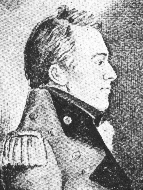 |
|
Isaac Brock |
In Fort Erie Brock learned to his unconcealed disgust that a thirty-day armistice had been proclaimed five days before. Military men oftimes complain that successes are thrown away with the pen that have been won or might be won by the sword. Brock had planned to duplicate his conquest at Detroit by the crossing the Niagara River and capturing Fort Niagara. If he had accomplished this and succeeded in dispersing the assembled American forces, he might very well have put an end to the campaign on the Niagara frontier. What could have been another golden moment was needlessly frittered away for an armistice which benefitted only the Americans. Sir George Prevost had initiated the armistice to which the American commander, General Henry Dearborn readily agreed in order to strengthen his weak defences. The truce had been arranged at Niagara between Major General Sheaffe and the Major General Stephen Van Rensselaer.
The heights at Lewiston were white with the tents of a large military camp and more were visible at Schlosser, Black Rock and at the rear of Fort Niagara. A large flotilla of boats suitable for transporting troops lay moored under the guns of Fort Niagara. Others had been taken to Lewiston. Men could be seen marching and drilling, attended by a numerous train of field artillery and detachments of cavalry. Brock sent the following letter to General Prevost on arriving back at Niagara. "I shall refrain as long as possible under your Excellency's positive injunctions from every hostile act although sensitive that each day gives the enemy an advantage."To his brothers regarding the truce, Brock wrote, "If peace follows the measure will be well. If hostilities recommence, nothing could be more unfortunate than this pause."
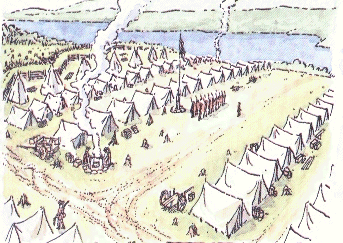 |
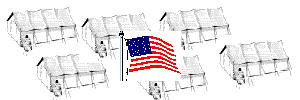 |
Brock's forestalled attack on Fort Niagara following his return from Detroit was according to one expert likely a good thing. Major-General Sir James Carmichael-Smyth, a veteran of the Peninsular war who spend several months in 1825 reporting on the defence of North Americ , suggested that even had Brock taken Fort Niagara, its defence against a numerically larger American army would have "been an inconvenience, compelling him to deprive himself of 300 or 400 men from his already too small disposable force for its garrison. In defensive warfare, delay is everything. The war was essentially defensive on the part of the British." Carmichael-Smyth spent several months in 1825 reporting on the defence of North America.
Brock's return to the peninsula did not go unnoticed. When he reached Queenston, he was surprised to be met by a delegation of "the principal residents," who warmly congratulated him on his astonishing success at Detroit. Brock was awed by the enthusiastic reception he received from the residents of the area, who spontaneously formed a procession on both sides of his open carriage and escorted him in triumph to Fort George. His "heart was cheered" that so many of Canada's best and bravest appeared ready to renew their pledge to sacrifice their lives to prevent "the invader's footstep from polluting the soil of their native or adopted country."
The joyous tumult continued at York and at Kingston where Brock was received by jubilant crowds. He never anticipated the outpouring of affection and esteem his success that Sunday, August 16th, 1812, had earned him. Only as addresses of welcome and letters of congratulation poured in from around the province did the true significance of his conquest at Detroit dawn upon him. With this totally unexpected victory Brock had made good his foothold in history. His elevation to the legendary status of Hero of Upper Canada awaited him at Queenston.
In a letter to his brothers dated September 3rd, Brock remarked in shocked surprise
In His Own Words
"They say the value of the articles taken at Detroit will amount to 30 or 40 thousand pounds. My portion will be something considerable. Should the affair (Detroit victory) be viewed in England in the light it is here, I cannot fail of meeting reward. The militia have been inspired by the recent success with confidence - the disaffected are silenced."
During the weeks of waiting Brock took advantage of the truce by employing his officers and men patrolling the river road to Queenston and Chippawa and Fort Erie. In whatever way he could he endeavoured to improve defences by organizing, dispatching, informing and reviewing, all with a view to strengthening in whatever way he could the thin red line protecting the fifty-eight kilometre frontier from Fort George to Fort Erie. The thousand muskets and accoutrements captured at Detroit were distributed to the militia. At Chippawa he posted a small detachment of the 41st and flank companies of the 2nd Lincoln militia and at Queenston flank companies of the 49th with a small body of militia. With the exception of a few militia scattered here and there along the line, the remainder of his forces were at Fort George under General Sheaffe.
Brock had located a number of powerful batteries along the lake front from Fort George to One Mile Creek confronting the guns of Fort Niagara. His strongest work was the huge Cavalier bastion at Fort George facing Fort Niagara which he had designed himself. Brock was proud of this skillful fortification which ironically later became his first resting place for twelve years following his death on the Heights. An extensive system of telegraphs and beacons was established stretching from the Sugar Loaf and Point Albino on Lake Erie along the lake and river to Lundy's Lane and Queenston then inland to Pelham Heights. This permitted the instantaneous signalling of the enemy's movement over the entire peninsula by day or night.
At 3 a.m. on Oct. 13, 300 regulars climbed into 13 bateaux and in the face of the deluging rain of a north-east storm, they started across under the command of Solomon Van Rensselaer. They were covered by an artillery bombardment provided by two 18-pounders in Fort Grey on the heights above Lewiston and a mortar in the woods nearby. They crossed at this location despite its swift-flowing current for it was only 250 yards at this point. Fighting the eddies of the wild water, they landed and unloaded some two hundred soldiers before they were discovered around four o'clock. British and Canadians forces opened fire on them with a 3-pounder and an infantry volley creating a combat zone of fog and flame.
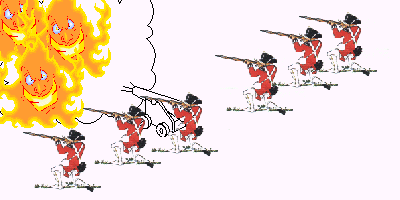 |
In his final few hours on earth Brock was occupied sending dispatches to the officers commanding posts along the frontier. These included a reassuring letter to Procter at Detroit. "Should I hear of reinforcements coming up you may rely on receiving your due proportion. May every possible success attend you." Brock also wrote a last letter home before touching pen to paper in his final report to Sir George Prevost. "The vast number of troops which have been added to the strong force previously collected on the opposite side convinces me with other indications that an attack is not far distant. I have in consequence directed every exertion to be made to complete the militia to 2000 men but fear that I shall not be able to effect my object with willing, well-disposed characters. Were it not for the numbers of Americans in our ranks we might defy all their efforts against this part of the province."
Early in the morning of Tuesday, October 13th Brock retired fully clothed only to be awakened a few hours later by the distant booming of cannon up the river. He immediately recognized the noise of the big 24-pounder at Vrooman's Point. Pulling on his boots he buckled on his sword, picked up his pocket watch and telescope and hurried outside where his aides-de-camp, Macdonell and Glegg, were awaiting orders. A soldier had saddled Alfred and was holding his reins.
While Brock was uncertain where the main attack would come, he least expected it from Lewiston. At this point just ten kilometres below the Falls the fast-flowing river could result in heavy losses. Brock had expected the main American thrust to be directed at Fort George and for this reason the bulk of his regulars were stationed there. In fact a diversionary feint by the Americans was supposed to have occurred between Fort Niagara and Fort George but because of the quarrelling, incompetent commanders it never took place. Even as cannons thundered in the distance Brock was not sure the attack on Queenston was anything more than a feint to fool his forces. He left instructions for Sheaffe to keep the garrison under arms in readiness to move in any direction once daylight revealled more fully the intent of the enemy.
Brock set spurs to Alfred and set off at a gallop on the exhausting ride to Queenston along the rutted, rain-soaked road filled with gullies and puddles. When he arrived at the foot of the mountain where the road diverges to St. David's, he and his horse were covered from head to foot with mud. He was immediately greeted by a hearty cheer from the men of the 49th Regiment, Brock's own regiment. These badly needed red coats had come from Lower Canada in August to reinforce Upper Canada. The regiment's grenadier and light companies along with militia companies from Lincoln and York were actively engaged in opposing the invading forces landing in Queenston.
Brock dispatched word to Sheaffe at Fort George to bring up the battalion companies of the 41st and the flank companies of the militia. Meanwhile cannons at Fort Niagara were firing away at Fort George, the red hot balls igniting flames at the court house, gaol, brewery and several houses. Despite the ensuing panic, volunteers quickly responded and doused the fires while a dozen heavy pieces of artillery at Fort George answered the American barrage and quieted but did not end their bombardment.
Brock rode up the slope to get a better view of the situation. He had ordered an 18-pounder and a mortar to be located in a redan (an earthwork with two faces forming a salient angle) on the Heights. The weapons had located the embarkation point across the river and were plastering it with shot and shrapnel causing said an American, "a scene of confusion hardly to be described."
Earlier in the morning an observant American captain named John E. Wool had noted the weakly defended British battery on the heights and the narrow, winding, unguarded Fisherman's Path that led up the 350 feet to the summit just south of the redan. Because they had thought the trail impassable, The British had posted no guards there. Wool led a detachment up the precipitous, circuitous trail by grasping rocks and bushes and emerged above and to the south of the British battery. Intent on surprising the regulars and seizing the cannon that was causing such chaos across the river, Wool led his forces stealthily through the trees.
Brock's first act on reaching Queenston was to order down the light company of the 49th from the heights into the village to support its hard-pressed grenadier company. He had little reason to suspect that in the half light an enemy party would be able to mount the steep path and make its way to the top. He rode up the slope to the one gun redan and dismounted to get a better view of the situation. He could see the massing of invaders awaiting their turn to cross in the boats ferrying groups to the Canadian side of the river. This was no mere feint. Suddenly over the crest of the Heights came a loud battle cry and Captain Wool and his American regulars charged down on the redan. There was just time to spike the touch hole of the 18 pounder and flee, Brock among them leading his horse and beating a hasty descent to the village.
Shortly before his death Brock had been cautioned by friends to be more careful of his person. He replied: "How can I expect my men to go where I am afraid to lead them?" Always quick to lead by example into the face of danger, Brock had readily risked his life more than was warranted. He did so again on this occasion. [See Below *] With his original mind and spontaneous nature, Brock acted instinctively. "When a man is fighting in a desperate conflict he may have to grind his teeth and flash his eyes so that anger and hatred nerve the arm of strife."
Now faced with the fact that Americans had occupied the Heights and captured the redan located there, Brock immediately assembled a few troops, some of whom were York volunteers, and with the small company about him and his sword in his hand, he started up the steep slope on foot to dislodge the invaders and retake the cannon. It was now around 7 a.m. and light enough to see that Brock made a perfect bullseye. The big commander in his bright red uniform and gold epaulettes was wearing the colourful scarf given him by Tecumseh. One shot through the breast felled him fatally. [***]
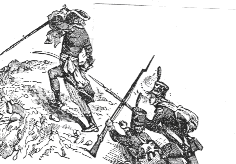 |
In London on the 13th of October, Irving Brock received a short note from Isaac which he had written at Detroit shortly after the victory.
In Brock's Own Words
"Rejoice at my good fortune and join me in prayers to heaven."
On that very same day, perhaps, even at the same hour at a place called Queenston Heights, Brock, too eager for untimely death, was killed climbing the hill. His death made him immortal and fostered the myth on which names and nations are created. Revisionist historians may wonder what Brock might have accomplished had he shown more discretion in the face of peril and put the country before his own conscience. Undoubtedly, Canada and its cause would have been better served had Brock displayed more prudence and less prowess. Such is the waste of war.
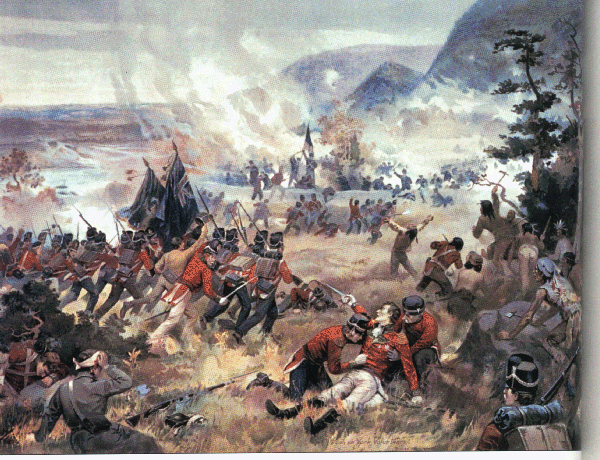 |
|
"Press on Brave York Volunteers"[**] |
Others died that day. One was the trumpeter to Brock at this historic battle.
Here lies within this silent grave
A Royal soldier, brisk and brave,
Who suddenly was called away
From this sodden foot of clay.
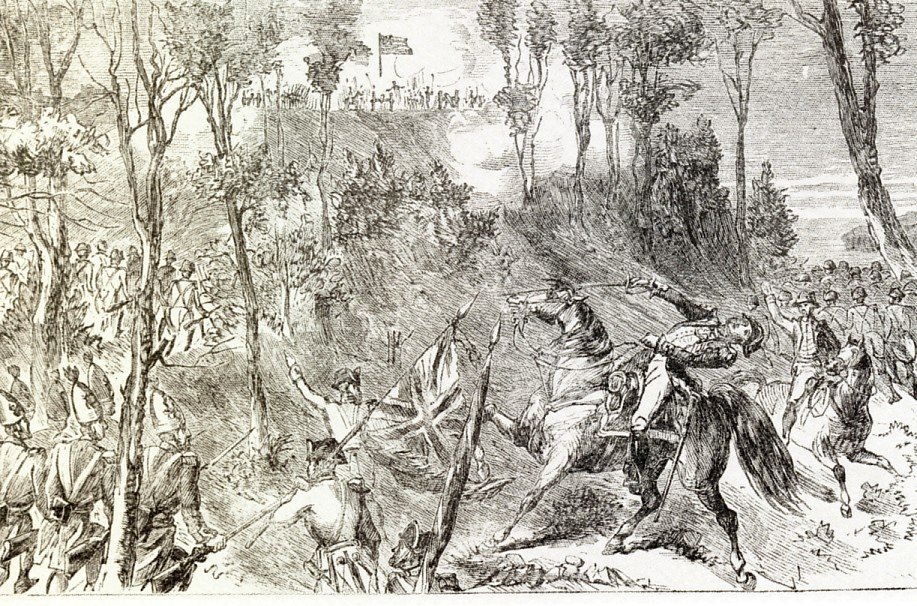 |
|
Another fanciful painting of Brock's death at the Battle of Queenston Heights. |
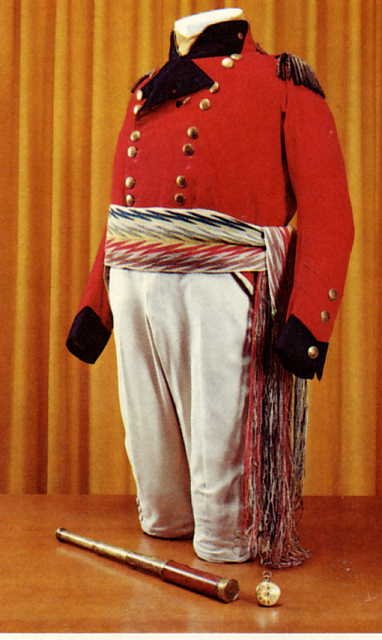 |
|
Brock's Tunic, Sash, Watch & Telescope [Note bullet hole just below collar.] |
Meanwhile Major General Roger Hale Sheaffe on whom command had devolved arrived from Fort George with reinforcements. Deigning to do what Brock had attempted, he wisely led his forces to the heights through the woods from the west. They combined with troops from Chippawa including militia and Native warriors under Chief John Norton. Their attack resulted in the rout of the the American invaders, many of whom were captured while other were driven back across the river in whose rapid waters a number drowned. All felt the wrath of Brock's warriors who were determined to avenge the death of their honoured chief.
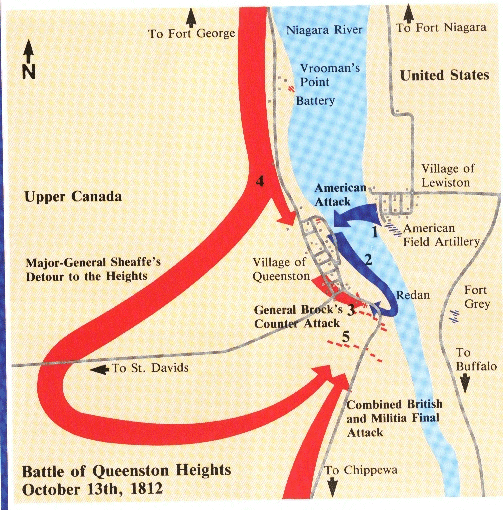 |
Some time later at York residents scanning the lake sighted the transport sloop Governor Simcoe and anxious to know of any news, some set off in small boats to greet the vessel.
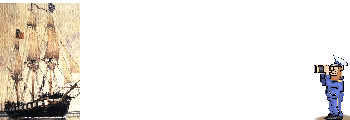 |
As they neared the ship they were astonished to see its deck packed with American military. Between cheers and excited shouts from the ship's crew they learned there had been a British victory at Queenston Heights. This explained the throng of American prisoners who later were loaded at York onto the schooner Moira for conveyance to Montreal to be exchanged. Earlier at Fort George, the American officers, militiamen and wounded regulars had been sent across the Niagara River on parole. In addition to the 927 prisoners of war some 500 Americans were killed or wounded. British casualties by comparison were minimal.
Elation at the news of the victory turned to stunned dismay when it was learned that Brock had been killed leading a charge. His death blurred triumph and tragedy, silenced celebrations and turned merriment into mourning. No one knew how to measure or mourn his loss. Victory became indistinguishable from defeat. Mastery over the Americans had come at a Pyrrhic price. Even the American President, James Madison, remarked on the gravity of Brock's death in his report to the Senate and House of Representatives. Describing the American defeat at Queenston Heights, Madison declared, "Our loss has been considerable and is deeply to be lamented. That of the enemy will be the more felt, however, as it includes among the killed the commanding general who was also the governor of the province." John Beverley Robinson, a leading light at York, declared that Brock was "the general who led our little army to victory, whose soul was wrapped up in our prosperity and whose every energy was directed to the defence of our country." No one doubted these words.The successful campaigns at Michilimackinac in July, Detroit in August and Queenston in October had been brief, brilliant and immortal. They became his titles to fame, glory and the everlasting gratitude of Canadians.
General Sheaffe bemoaned the loss of his great colleague in the message he sent to Sir George Prevost regarding his "brilliant" victory on the hill. "I am excessively grieved in having to add that Brock fell whilst gallantly cheering his troops to an exertion for maintaining it. This brilliant success is clouded by the ever-to-be lamented death of Major-General Brock. The zeal, ability and valor with which he served his King and country render this a public loss that must long be deplored and his memory will live in the hearts and affections of those who had the opportunity of being acquainted with his private worth."
Brock's family learned of the tragic loss of their loved one from Brock's other aide-de-camp. Major J.B. Glegg in a letter from Fort George dated 14th Oct.1812. It was fitting that news of his death was carried to his native island of Guernsey by the ship Fame.
"My Dear Sir:
With a heart agonized with the most painful sorrow, I am compelled by duty and affection to announce to you the death of my most valuable and ever to be lamented friend, your brother, Major-General Brock.
He fell yesterday morning at an early hour when at the head of a small body of regular troops consisting of the flank companies of the 49th Regiment disputing every inch of ground with a very superior body of the enemy's troops in the town of Queenston. The ball entered his right breast and passed through on his left side. His sufferings, I am happy to add were of very short duration and were terminated in a few minutes when he uttered in a feeble voice: "My fall must not be noticed or impede my brave companions from advancing to victory."
His lifeless corpse unperceived by the enemy was immediately conveyed into a house at Queenston and although we were obliged by overwhelming numbers to leave it there for some hours. Upon victory declaring in our favour, I hastened to the spot and finding my lamented friend in the same concealed place where we had left it in the morning, the body was immediately conveyed to Fort George where it now lies in state in the Government House already bedewed by the tears of many affectionate friends.
His loss at any time would have been great to his relations and friends, but at this moment I consider the melancholy event as a public calamity. He was beloved and esteemed by all who had the happiness to know him and was adored by his army and by the inhabitants of this province.
Signed: Major J. B. Glegg, Aide de Camp
Copyright © 2013 Website Administrator